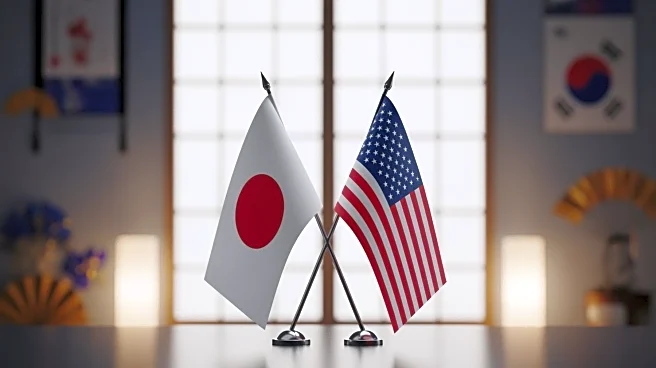What's Happening?
U.S. President Donald Trump met with Japan's newly elected Prime Minister Sanae Takaichi in Tokyo, marking a significant moment in his Asia trip. During the meeting, President Trump reaffirmed the United
States' commitment to being an 'ally at the strongest level' with Japan. This meeting comes shortly after Takaichi's election, and it is seen as an opportunity for her to establish a personal rapport with President Trump, potentially easing trade tensions between the two nations. One proposal from Japan's government includes purchasing a fleet of American Ford F-150 trucks, which could be a strategic move to strengthen economic ties. President Trump's visit to Asia also includes discussions on trade with various world leaders, highlighting the importance of international economic relations.
Why It's Important?
The meeting between President Trump and Prime Minister Takaichi is crucial for U.S.-Japan relations, particularly in the context of trade and economic cooperation. Strengthening this alliance could have significant implications for both countries' economies, potentially leading to increased trade and investment opportunities. For Japan, aligning closely with the U.S. may provide economic benefits and security assurances, especially in the face of regional challenges. For the U.S., maintaining a strong alliance with Japan is vital for its strategic interests in Asia, including counterbalancing China's influence. The proposed purchase of American trucks by Japan could also bolster the U.S. automotive industry, showcasing the potential economic gains from this diplomatic engagement.
What's Next?
As President Trump continues his Asia trip, further discussions on trade and economic cooperation are expected. The outcomes of these meetings could lead to new agreements or initiatives aimed at enhancing bilateral relations. Additionally, the response from other regional players, particularly China, will be closely watched, as any shifts in U.S.-Japan relations could impact the broader geopolitical landscape in Asia. The potential trade deals and economic collaborations resulting from these discussions may also influence domestic policies in both countries, particularly in sectors like automotive and manufacturing.










